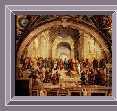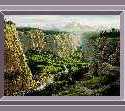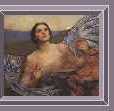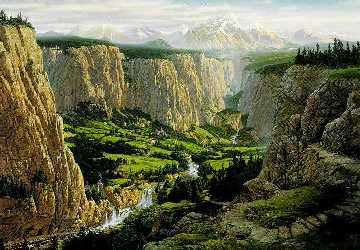Magic, Middle-earth, Merlin, Muggles, and Meaning
A Christian Reading of Spells and the Supernatural
in the Works of J.R.R. Tolkien and C.S. Lewis, and in J. K. Rowling's Harry Potter Books
Most people today would probably say that they don't "believe in magic"; which is to say, they don't believe that magic is real, that it "works"; that there are in the world magical forces or energies that can be manipulated or controlled through the sort of techniques or paraphernalia we associate with magic -- incantations, wands, gestures, potions, and so forth. While many forms of occult practice, such as Ouija boards, seances, charms, crystals, Tarot cards, and horoscopes, are commonplace and socially acceptable, most people today tend not to take these things very seriously, regarding them as amusing diversions at best, silly superstitions at worst.
Christians also have historically rejected belief in magic in this fundamental sense. But there is also another, more important sense in which magic is contrary to Christian belief: the attempted practice of magic is rejected as wrong and even dangerous.
Christian repudiation of magic has its roots in the Old Testament (e.g., Deut 18: 9-14, Ex 22: 18). St. Thomas condemned sorcery and divination as vices opposed to religion, citing St. Augustine's rejection as "superstition" of "experiments of magic arts, " "amulets, " "incantations, " and "cyphers" (Summa Theologica II-II, 96, 2, citing De Doctr. Christ. 2, 20). In our own day, The Catechism of the Catholic Church has unequivocally denounced as "gravely contrary to the virtue of religion" all "practices of magic or sorcery, by which one attempts to tame occult powers, so as to place them at one's service and have a supernatural power over others -- even if this were for the sake of restoring their health", as well as all "forms of divination" (CCC 2115 - 2117).
Why do Christians regard magic as evil and dangerous? There are several reasons. For one thing, sorcery and divination are forbidden in sacred scripture, which makes them contrary to Christian obedience and piety. For another, while it is true that there are no benign or neutral magical forces, there are other, real supernatural powers, of a decidedly non-benign persuasion, and the attempt to interact with nonexistent magical forces can leave one susceptible to deception and harm from these other, all-too-real powers. Attempted magic is thus not only ineffective (inasmuch as magical forces don't exist), but also at best dangerous, and, where knowledge is sufficient, morally wrong as well (inasmuch as demons do exist). Needless to say, the sort of occult activity that explicitly involves invoking or summoning evil spirits is still more immoral and dangerous.
Yet in spite of all this, highly esteemed Christian writers such as J.R.R. Tolkien and C.S. Lewis -- neither of whom entertained the slightest doubts about the moral evil of attempted magic in the real world -- have employed magic as a literary device in their works of fiction. Nor have they restricted magic as an evil pursuit of wicked or misled characters, but have depicted it, within the fictional context of their works, as a morally safe and lawful pursuit for at least some good characters at some times and in some places.
But this practice, while it may have caused a few fundamentalistic critics to reject these works out of hand, has not prevented most thoughtful Christian readers from holding The Lord of the Rings and The Chronicles of Narnia in reverence. Such readers have accepted the use of magic as a literary device within an imaginary world in which the rules of the universe, moral as well as physical, are different from the rules in our own world.
And, indeed, it's hard to see, once one admits the validity of writing any sort of fiction at all, on what grounds one might consistently object to the literary depiction of magic as a safe and lawful pursuit. For to write fiction is to imagine at least events, usually persons, and sometimes even places that have no real being in the world as God has actually created it. But if it's valid to imagine the world to be other than how God has actually created it, it seems arbitrary to restrict this imaginative revision of God's world to the invention of fictional events, persons, and places, while excluding, for example, the invention of fictional physical laws (e.g., laws allowing travel through time or faster than light) or even fictional moral laws (as, e.g., in Lewis' Perelandra, which depicts a world whose inhabitants are morally bound not to dwell on a particular island).
Of course, it's one thing to imagine a world in some way different from the one God has actually created, but quite another to imagine a world so different that it could not possibly be created by the God who is -- a world that would logically entail a different sort of God altogether. God really could create a world in which there was a particular island upon which the inhabitants might not dwell. But God couldn't create a world in which hate was good and love was evil, because the goodness of love is an eternal and immutable fact about Himself.
But it isn't necessary to rewrite the character of God in order to imagine a world in which magic might be safely and lawfully pursued. Obviously a magic based upon consorting with and controlling evil spirits or demons would be wrong and dangerous in almost any conceivable world: but it's easy to imagine a fictional world in which God has created neutral or benevolent powers or forces that can be engaged or controlled by such magical paraphernalia as incantations or wands; and in which the attempt to interact with or control these forces can be lawful. And this is in fact what Tolkien and Lewis have done.
But does this mean that there are no possible pitfalls or dangers to the literary use of magic as a safe and lawful pursuit? Once Christian readers have accepted Tolkien and Lewis, are they bound in principle not to object to any depiction of magic as a lawful pursuit?
Dr. Alan Jacobs, Professor of English at Wheaton College, is a thoughtful reader and literary critic who appears with some frequency on Ken Myer's Mars Hill Journal, a "bimonthly audio magazine of contemporary culture and Christian conviction." Dr. Jacobs' remarkably insightful discussions of such subjects as Anne Rice's Vampire Chronicles (Literary Quality:  ; Christian Morality: Offensive; Age Appropriateness: Inappropriate) have helped to inform and enrich my own thinking.
; Christian Morality: Offensive; Age Appropriateness: Inappropriate) have helped to inform and enrich my own thinking.
However, in a short Mars Hill interview devoted to J. K. Rowling's wildly popular Harry Potter books, Dr. Jacobs seemed to argue rather broadly that Christian parents who accept the magic in such works as The Lord of the Rings cannot consistently object to the depiction of magic in the Harry Potter books. (To be fair to Dr. Jacobs, it was a short discussion; and he did suggest that he had some reservations about the books, though he didn't indicate whether any of these had to do with the way magic was used, and certainly he didn't offer listeners the slightest help in discerning how, once they have accepted Tolkien or Lewis, they could then critically evaluate the use of magic in Rowling.)
The fact is, however, that Tolkien and Lewis were both very much aware of the potential pitfalls of using magic in literature, whatever benefits it might also offer. Both men wholeheartedly rejected the possibility of lawful magic in the real world. Neither had the slightest desire -- either would have been appalled -- to see their readers develop a tolerance for the idea of magic in the real world, or, worse, become interested in such real-world occult practices as spells, charms, seances, or fortune telling.
And, in fact, it isn't at all likely that readers of Tolkien or Lewis' writings ever would be influenced in such a direction: because the use of magic in Tolkien and Lewis has been set off by a series of what I am going to call narrative "hedges" or "barriers" -- important and formidable literary caveats that make it very difficult for the reader to get the wrong idea, or to become snared by the potential pitfalls. What are these "hedges," and how do they work? Here are six, only one of which (the first one) applies to Rowling's books. I will summarize them here, and explore them in detail later.
1. In general, Tolkien, Lewis, and Rowling -- especially Rowling -- depict magic in completely fantastical terms that bear no resemblance to actual occult practices in the real world, and that no one could possibly delude themselves into thinking they could successfully emulate. That is, whereas some more dangerous cultural depictions of magic include such genuinely dangerous phenomena as seances and astral projection, in Tolkien, Lewis, and Rowling you get wizards who can generate fire at a word, or who have books with spells of invisibility, or who ride flying broomsticks -- manifestations that are clearly meant to be make-believe and have virtually no potential to inspire direct imitative behavior.What is the net literary effect of all these "hedges" in Tolkien and Lewis? Essentially, they serve to separate and distinguish as clearly as possible the fictional situations in which magic may safely and lawfully be pursued from real situations involving real people in the real world. Magic, Tolkien and Lewis are effectively saying, may be a safe and lawful occupation for someone like Gandalf, an Istari-wizard of Middle-earth, or for Coriakin, an anthropomorphic Narnian star-wizard; but that is a long, long way from someone like me having my cards read or checking my horoscope in the morning.2. Tolkien and Lewis relegate the pursuit of magic as a safe and lawful occupation to wholly imaginary realms, with place-names like Middle-earth and Narnia, that cannot be located either in time or in space with reference to our own world. By contrast, Harry Potter lives in a fictionalized version of our own world that is recognizable in time and space, in a country called England, in a timeframe of our own age.
3. Tolkien and Lewis relegate the safe and lawful pursuit of magic to characters who are numbered among the supporting cast, not the protagonists with whom the reader is primarily to identify. By contrast, Harry Potter, a student of wizardry, is the title character and hero of his novels.
4. Tolkien and Lewis relegate the pursuit of magic as a safe and lawful occupation to characters who are not in fact human (despite the human appearance of some, like Tolkien's Gandalf and Lewis' Coriakin; whom in fact we are told are, respectively, a semi-incarnate angel and an earthbound star). In Harry Potter's world, by contrast, while some human beings (called "Muggles") lack the capacity for magic, others, including Harry's true parents (and of course Harry himself), do not.
5. Tolkien and Lewis relegate the safe and lawful pursuit of magic to characters who, in appearance, stature, behavior, and role, embody a certain wizard archetype -- white-haired old men with beards and robes and staffs, mysterious, remote, unapproachable, who serve to guide and mentor the heroes. Harry Potter, by contrast, is a peer to many of his avid young readers, a boy with the same problems and interests that they have.
6. Tolkien and Lewis devote no narrative space to the process by which their wizard archetypes acquired their magical prowess. In the Harry Potter books, by contrast, Harry's acquisition of mastery over magical forces at the Hogwarts School of Wizardry and Witchcraft is a central organizing principle in the story-arc of the series as a whole.
J. K. Rowling, on the other hand, is as far as I know writing without any of Tolkien's or Lewis' caution regarding the dangers of the attempted practice of magic or the occult in the real world. As far as Rowling is in all probability concerned, the only plausible caveat about magic in the real world is that it doesn't work.
For her, therefore, wizardry and witchcraft are presumably wholly imaginary constructs that offer boundless opportunities for imaginative storytelling with no more potential risk to the reader than fantasies about travelling at warp speed, or developing arachnoid super-powers from the bite of a radioactive spider. Rowling, therefore, has not seen fit to hedge about her use of magic in the way that Tolkien and Lewis have done.
But Tolkien and Lewis, though they would not have been familiar with either of the above examples, would have appreciated the fact that there is (a) little enough likelihood of young devotees of Star Trek or Spiderman ever attempting actually to develop warp technology or spider powers; and, more importantly, (b) no obvious risk even in the event that any of them should actually seek to do so.
But is there equally no risk of young Harry Potter fans developing an unhealthy infatuation with the idea of magic, and in particular with the idea of studying and learning magic? Might not such infatuation, at some later date, in the absence of adequate parental guidance, be one factor influencing a child to respond more positively or with greater tolerance toward everyday occult phenomena? Might it be one factor influencing a child to respond with greater interest or tolerance to Wicca, or the Kabbalah?
These seem to me reasonable concerns; and Christian parents may want to be aware that Rowling, unlike Tolkien or Lewis, doesn't seem to share them. Consequently, greater parental guidance is required to avoid the pitfalls of the use of magic in the Harry Potter books than in The Lord of the Rings or The Chronicles of Narnia.
I don't mean to suggest that the absence of these literary safeguards in Rowling automatically makes her work inherently unacceptable, harmful, or even necessarily morally inferior (though I do in fact think on other grounds that it is somewhat morally inferior). But I think that Christian readers, and particularly Christian parents, should be aware, first, of the pitfalls that always attend the use of magic in literature; and second, that Rowling has not given them the safeguards present in Tolkien and Lewis; and that if their children do read the Harry Potter books they may need extra guidance to avoid these pitfalls, which would not be the case with respect to The Lord of the Rings or The Chronicles of Narnia.
One serious pitfall that the Harry Potter books do not fall into -- though other treatments of magic in popular culture do -- is that of depicting magic in terms of invoking, summoning, channeling, or conjuring spirits, gods and goddesses, or demons. Not unlike Tolkien and Lewis, Rowling depicts "magic" as a power or force that is either neutral, good, or comprising good and evil components; and certainly as something that has nothing to do with manipulating or controlling evil spirits or demons. This is less a "hedge" or safeguard than a virtual prerequisite for any morally acceptable treatment of magic as a safe and lawful pursuit. Whatever problems Rowling's works might have, she did at least get this right. There are poltergeists and Casper-type ghosts, but no seances; spells, but no invocations; a bewildering riot of monsters and beasties; but no divinities. The wizard's art depends not upon invoking or summoning spiritual entities, but simply upon knowing how to control magical forces, much as we control physical forces in the real world with light switches and accelerators. In contrast to some of the real spiritual poison that can be found in such TV shows as Buffy the Vampire Slayer and in such movies as The Craft, Rowling's world has the potential for wholesome fantasy.
Yet the fact remains that in the real world occult practices are harmful and dangerous even if they are understood to involve benign magical forces and not spirits or demons. So it's still helpful to protect the reader against misunderstanding or harmful effects; and this is the effect of the six literary "hedges" in Tolkien and Lewis.
Rowling, who isn't aiming for such hedges, nevertheless does manage to get one out of six; and to be fair it is one of the most important. Magic in her works is completely fantastic, bearing no resemblance to actual occult practices in the real world, and could not possibly be mistaken for something that anyone in the real world successfully emulate. There is virtually no potential for imitative behavior; is all unmistakably make-believe. It uses the conventions of fantasy magic: flying on broomsticks, for example, is instantly recognizable as an institution of the fantasy world of Wendy, Broom Hilda and the Wicked Witch of the West, not the real world of Wicca, neopaganism, and occult practice. Although there may be an occasional infelicitous convergences with reality (the third book opens with Harry writing a paper on the pointlessness of witch-burning in the fourteenth century), by and large the treatment of magic in her book is over the top in the extreme. Needless to say, good magic in Tolkien and Lewis also bears no resemblance to real-world occult practices, though without the cartoony extremes of Rowling. But these extremes, if anything, count here in her favor.
Nevertheless, there is still cause for concern. Consider the second hedge in Tolkien and Lewis: Both writers relegate the safe and lawful pursuit of magic to the wholly imaginary realms of Middle-earth and Narnia, which cannot be located in time or in space in relation to our own world.
In The Chronicles of Narnia, in particular, the pursuit of magic in our world is the exclusive domain of evil personages like Uncle Andrew (and his fairy godmother, a Le Fay [!]). In fact, it is only through Uncle Andrew's illicitly created magical rings that any sons of Adam or daughters of Eve are ever introduced to realms in which magic is not illicit. Nowhere does Lewis treat of a safe and lawful magic based in our world. As for Tolkien, of course, the distance between our world and his Middle-earth is unbridgeable even by magic rings (which are of course very much in evidence in other connections!).
Harry Potter, on the other hand, lives in modern-day England, if a fictionalized modern-day England. Although the fictionalizations are hardly subtle -- in addition to the obvious introduction of magical forces and creatures, there are numerous other fictional incursions into reality, such as the British Government's "Ministry of Magic" (a clandestine institution to be sure) -- it is still in a real sense our world.
Even so, to be fair to Rowling, the dynamic of "another world" is not entirely missing here. While she has not invented a wholly imaginary realm, she has created a kind of world-within-a-world composed of magical "zones" with names like Diagon Alley and Hogwarts School, zones one enters wardrobe-fashion through magical pubs and phantom train platforms. And in fact Harry is not allowed to use his magic in the Muggle world. However, this is not because magic itself in the Muggle world is morally wrong, but only because Hogwarts policy forbids students to do it. Grown-up wizards, such as Albus Dumbledore, Headmaster of Hogwarts, can and do make judicious use of magic in the "real" world.
Next




 © 26 May, 2000
© 26 May, 2000
Updated 13 June, 2000
All Rights Held by the Author.
No part of these pages may be used or copied without express permission of the author.

